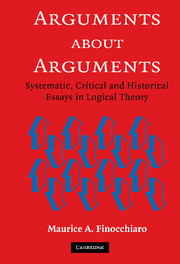Book contents
- Frontmatter
- Contents
- Preface and Acknowledgments
- Introduction : An Approach to a Branch of Logic
- Theorizing about reasoning and argument
- Fallacies and asymmetries
- Critiques
- 10 Siegel on Critical Thinking : Reasoning versus Rationality versus Criticism (1989)
- 11 Induction and Intuition in the Normative Study of Reasoning : Cohen on Inductive Reasoning in Philosophy (1991)
- 12 Logic, Politics, and Gramsci
- 13 The Dialectical Approach to Interpretation and Evaluation : From Axiom to Dialogue (Barth) and from Structure to Dialogue (Freeman) (1995)
- 14 The Port-Royal Logic's Theory of Argument
- 15 A Critique of the Dialectical Approach, Part Ⅱ : The Amsterdam School and Walton on Complex Dialogues (1999)
- 16 Valid Ad Hominem Arguments in Philosophy
- 17 Dialectics, Evaluation, and Argument : Goldman and Johnson on the Concept of Argument (2003)
- Historical analyses
- Selected Bibliography
- Index
11 - Induction and Intuition in the Normative Study of Reasoning : Cohen on Inductive Reasoning in Philosophy (1991)
from Critiques
Published online by Cambridge University Press: 05 February 2015
- Frontmatter
- Contents
- Preface and Acknowledgments
- Introduction : An Approach to a Branch of Logic
- Theorizing about reasoning and argument
- Fallacies and asymmetries
- Critiques
- 10 Siegel on Critical Thinking : Reasoning versus Rationality versus Criticism (1989)
- 11 Induction and Intuition in the Normative Study of Reasoning : Cohen on Inductive Reasoning in Philosophy (1991)
- 12 Logic, Politics, and Gramsci
- 13 The Dialectical Approach to Interpretation and Evaluation : From Axiom to Dialogue (Barth) and from Structure to Dialogue (Freeman) (1995)
- 14 The Port-Royal Logic's Theory of Argument
- 15 A Critique of the Dialectical Approach, Part Ⅱ : The Amsterdam School and Walton on Complex Dialogues (1999)
- 16 Valid Ad Hominem Arguments in Philosophy
- 17 Dialectics, Evaluation, and Argument : Goldman and Johnson on the Concept of Argument (2003)
- Historical analyses
- Selected Bibliography
- Index
Summary
Introduction
In the contemporary philosophical scene, the work of L. Jonathan Cohen stands out in several ways. One stems from the significance, range, and combination of topics on which he focuses, which are primarily reasoning and rationality, induction and probability, metaphilosophy, philosophy of science, and philosophy of law. Another relates to the character of the approach he follows in his investigations, and which I would describe as both theoretically deep and practically relevant, both insightful and well argued, rigorous without being pedantic, and original without being cranky. Cohen's work also deserves admiration and emulation because of the particular stand he takes on the issues and the particular conclusions he arrives at in regard to the topics studied; and here I have in mind his defense of human rationality from the attacks of experimental psychologists, his defense of democratic values and principles in regard to the use of lay juries in jurisprudence, and his defense of pluralism, open-mindedness, and dialogue in analytical philosophy.
In the light of all this, it is obvious that my remarks here cannot do full justice to the depth and variety of Cohen's work. I shall limit myself to some issues in his latest book (1986), and even in regard to them I feel that all I can do is to provide what may serve as the beginning of a potential dialogue, rather than a full analysis and resolution of them.
Information
- Type
- Chapter
- Information
- Arguments about ArgumentsSystematic, Critical, and Historical Essays In Logical Theory, pp. 193 - 206Publisher: Cambridge University PressPrint publication year: 2005
